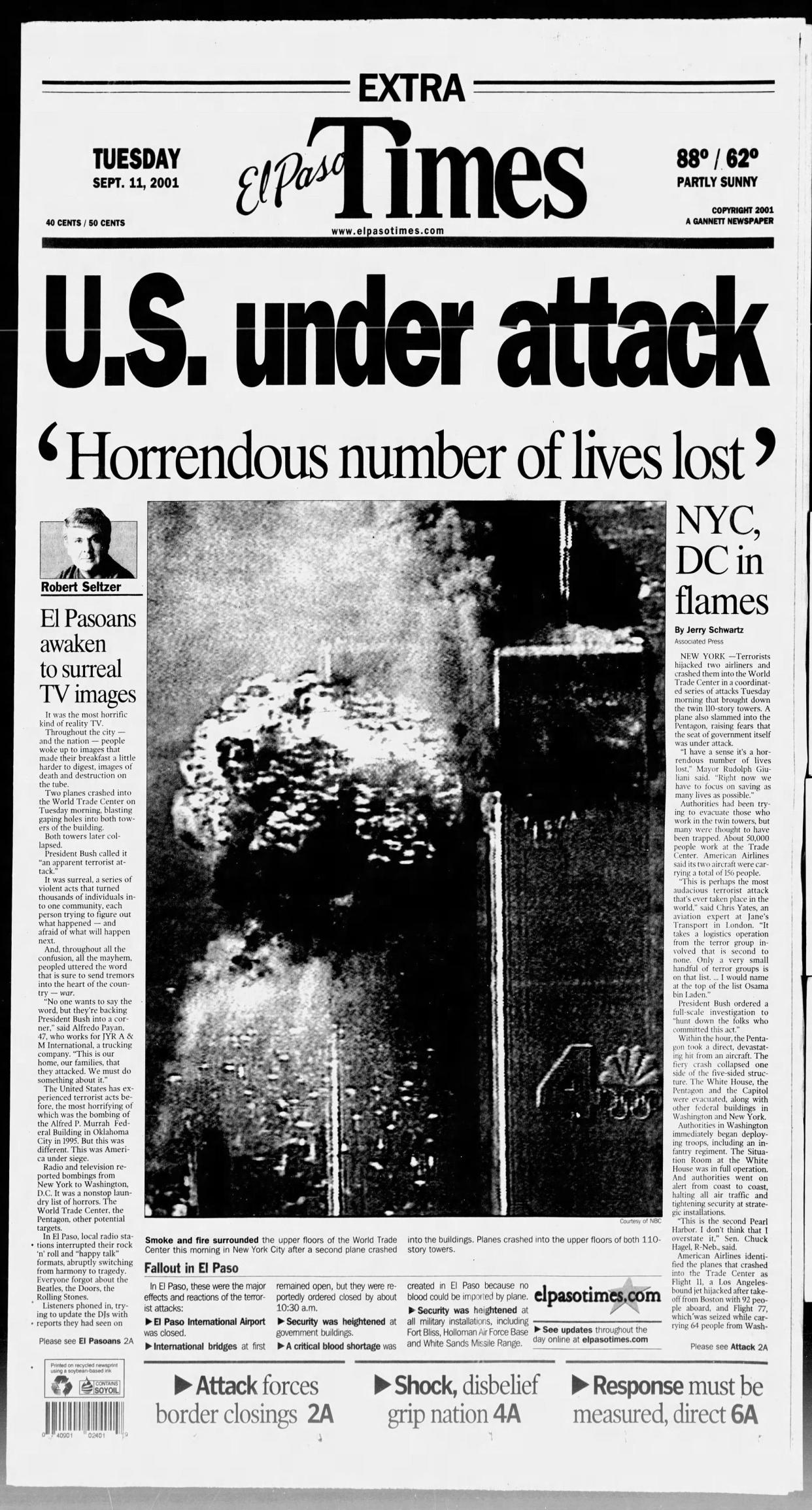Extra!: NYC, DC in flames after 9/11 terrorist attack

A newspaper extra is a special issue of a newspaper, published outside the normal publishing schedule, to report major news which occurred too late for the regular edition. On Sept. 11, 2001, the El Paso Times published an extra edition with the headline, ‘U.S. under attack.’
On that fateful morning, terrorists hijacked four commercial passenger airplanes and carried out four suicide attacks. Two planes were flown into the World Trade Center in New York City. Within a few hours, both Twin Towers collapsed. A third plane hit the Pentagon in Arlington, Virginia. The passengers and crew of the fourth plane fought back, and the plane was downed in a field near Shanksville, Pennsylvania.
Almost 3,000 people were killed in the attacks, including the 19 terrorists. The shocking events were televised globally.
More: Sept. 11, 2001: El Pasoans reacted with sorrow and acts of unity on one of country's darkest days
Fallout in El Paso
In El Paso the major effects of the terrorist attacks were the closing of the El Paso International Airport and International bridges, security was heightened at government buildings, a critical blood shortage was created because no blood could be imported by plane and security was heightened at military installations including Fort Bliss, Holloman Air Force base and White sands Missile Range.
El Pasoans awaken to surreal TV images
In that extra edition, El Paso Times columnist Robert Seltzer wrote about “the most horrific kind of reality TV.”
Throughout the city--and the nation--people woke up to images that made their breakfast a little harder to digest, images of death and destruction on the tube.
Two planes crashed into the World Trade Center on Tuesday morning, blasting gaping holes into both towers of the building.
Both towers later collapsed.
President Bush called it "an apparent terrorist attack."
It was surreal, a series of violent acts that ruined thousands of individuals in not just one community, each person trying to figure out what happened--and afraid of what will happen next.
And, throughout all the confusion, all the mayhem, people uttered the word that is sure to send tremors into the heart of the country--war.
"No one wants to say the word, but they're backing President Bush into a corner," said Alfredo Payan, 47, who works for JYR A&M International, a trucking company. "This is our home, our families, that they attacked. We must do something about it."
This was different
The United States has experienced terrorist acts before, the most horrifying of which was the bombing of the Alfred P. Murrah Federal Building in Oklahoma City in 1995. But this was different. This was America under siege.
Radio and television reported bombings from New York to Washington, D.C. It was a nonstop laundry list of horrors. The World Trade Center, the Pentagon, other potential targets.
In El Paso, local radio stations interrupted their rock'n'roll and "happy talk" formats, abruptly switching from harmony to tragedy. Everyone forgot about the Beatles, the Doors, the Rolling Stones.
Listeners phoned in, trying to update the DJs with reports they had seen on television. The destruction was so horrible, so ghastly, that it was hard to fathom. It was like a video game without the joystick ... Buildings bursting into flames, then crumbling like sandcastles ... People jumping out of windows, their fiery bodies tracking their hideous descents ... Dust enveloping the streets of Manhattan.
Destruction that touched everyone
Thousands of miles away, in El Paso, people voiced the unspeakable. These were not just televised images, dots on the screen with little relevance elsewhere in the country. No, this was destruction that touched everyone from Altoona, Pa., to Lodi, Calif. And everyone seemed to feel the same dread, the same anxiety: This could happen anytime, anywhere.
"It could happen here, in this building," said John Taylor, 48, a security guard at the Wells Fargo Bank Downtown. "I try to deal with it. I try to put it out of my mind. But the anxiety is there. We had a security meeting in the morning. They told us to be on alert. We're watching out for unusual-looking people, people who want to go to the basement or to the top floors."
The sad truth, however, is that evil is becoming less and less unusual; it is becoming part of the landscape.
Trish Long may be reached at tlong@elpasotimes.com or 915-546-6179.
This article originally appeared on El Paso Times: El Pasoans awake to surreal TV images on 9/11

